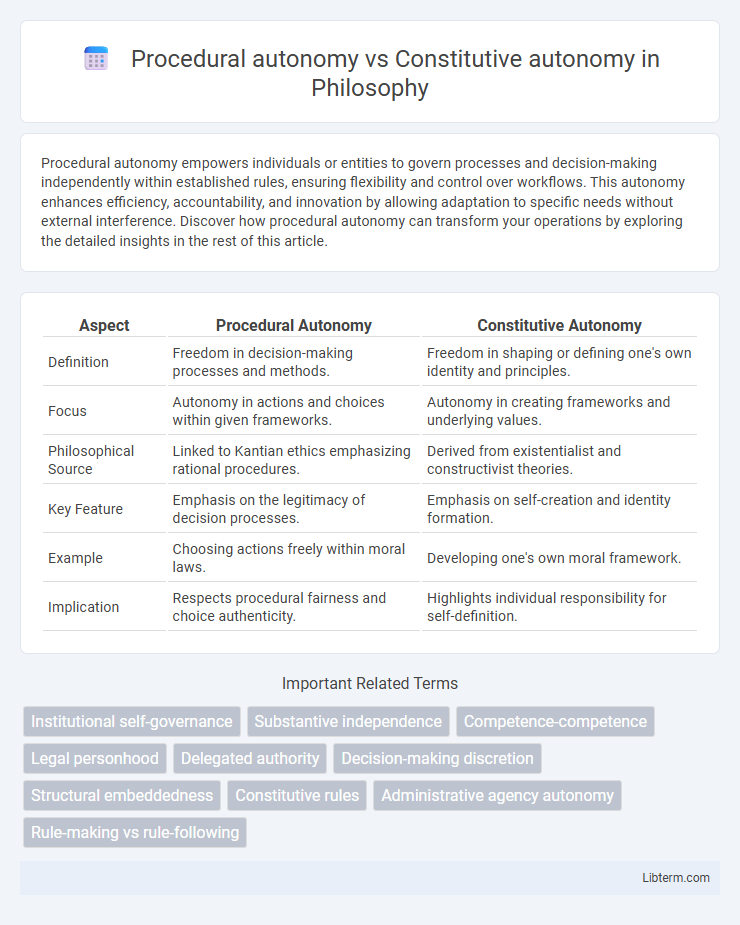Procedural autonomy empowers individuals or entities to govern processes and decision-making independently within established rules, ensuring flexibility and control over workflows. This autonomy enhances efficiency, accountability, and innovation by allowing adaptation to specific needs without external interference. Discover how procedural autonomy can transform your operations by exploring the detailed insights in the rest of this article.
Table of Comparison
| Aspect | Procedural Autonomy | Constitutive Autonomy |
|---|---|---|
| Definition | Freedom in decision-making processes and methods. | Freedom in shaping or defining one's own identity and principles. |
| Focus | Autonomy in actions and choices within given frameworks. | Autonomy in creating frameworks and underlying values. |
| Philosophical Source | Linked to Kantian ethics emphasizing rational procedures. | Derived from existentialist and constructivist theories. |
| Key Feature | Emphasis on the legitimacy of decision processes. | Emphasis on self-creation and identity formation. |
| Example | Choosing actions freely within moral laws. | Developing one's own moral framework. |
| Implication | Respects procedural fairness and choice authenticity. | Highlights individual responsibility for self-definition. |
Introduction to Procedural and Constitutive Autonomy
Procedural autonomy refers to the capacity of a system or agent to govern its own decision-making processes and operations through self-imposed rules and procedures. Constitutive autonomy, on the other hand, involves the foundational ability of a system to define and create its own components, boundaries, and organizational structure, essentially shaping its very identity. Understanding the distinction between procedural and constitutive autonomy is essential for analyzing systems in fields such as artificial intelligence, robotics, and organizational theory, where both the ability to operate independently and the power to self-construct determine functional autonomy.
Defining Procedural Autonomy
Procedural autonomy refers to the capacity of individuals or institutions to establish and follow their own rules and decision-making processes without external interference, emphasizing self-governance in operational methods. This form of autonomy is crucial in legal systems, organizational management, and artificial intelligence where internal protocols dictate actions and outcomes. It differs from constitutive autonomy, which centers on the inherent ability to form one's identity or existence autonomously.
Understanding Constitutive Autonomy
Constitutive autonomy refers to the inherent capacity of a system or agent to self-produce and maintain its own organization, distinguishing it from procedural autonomy, which emphasizes rule-following and behavior regulation. Understanding constitutive autonomy involves recognizing how living systems generate identity and continuity through internal processes, enabling adaptive interactions with their environment. This concept is pivotal in fields like biology, cognitive science, and artificial intelligence, where it explains self-maintenance and autonomous functionality beyond externally imposed procedures.
Key Differences Between Procedural and Constitutive Autonomy
Procedural autonomy refers to the capacity to govern one's own decision-making processes and methods, emphasizing self-regulation in how decisions are made. Constitutive autonomy involves the foundational structures and rules that define an entity's identity and powers, determining what decisions can be made. Key differences center on procedural autonomy focusing on the internal processes of action, while constitutive autonomy establishes the essential framework and authority within which those processes operate.
Philosophical Foundations of Autonomy
Procedural autonomy emphasizes the individual's capacity to self-govern through adherence to rational decision-making processes, rooted in Kantian ethics and the primacy of reason. Constitutive autonomy centers on the formation of the self, where identity and values emerge from social interactions and are essential to authentic self-expression, drawing from existentialist and communitarian philosophies. These foundational perspectives debate whether autonomy is primarily about following internal principles or evolving through relational contexts.
Procedural Autonomy in Ethical Decision-Making
Procedural autonomy in ethical decision-making emphasizes the importance of individuals following self-imposed rules and guidelines that reflect their rational capacities without external coercion. This form of autonomy prioritizes the processes and methods used to arrive at ethical judgments, ensuring that decisions are made through consistent, principled reasoning rather than predefined content or specific outcomes. By focusing on procedural integrity, procedural autonomy supports the development of moral agency and accountability in diverse ethical contexts.
Constitutive Autonomy and Personal Identity
Constitutive autonomy refers to the ability of a system or agent to define and regulate its own structure and identity, playing a crucial role in shaping personal identity by allowing an individual to self-organize and maintain a coherent sense of self. It emphasizes the internal generation of norms, values, and meanings rather than merely following external procedures, thereby supporting the continuous development and transformation of personal identity over time. This form of autonomy underpins authentic self-expression and personal growth, distinguishing it from procedural autonomy, which is limited to decision-making processes within predetermined frameworks.
Implications for Law and Policy
Procedural autonomy emphasizes individuals' rights to control processes affecting them, directly influencing legal frameworks that prioritize informed consent and participatory decision-making. Constitutive autonomy focuses on the capacity to shape one's identity and values, prompting policies to protect self-formation against external manipulation. Legal systems must balance these autonomies to ensure both fair procedural protections and respect for personal development in crafting laws around privacy, bioethics, and digital rights.
Critiques and Controversies
Procedural autonomy faces critiques for its rigid adherence to formal rules, often neglecting substantive justice and diverse cultural contexts, leading to accusations of procedural elitism. Constitutive autonomy is criticized for potential ambiguity in defining essential group characteristics, which can result in exclusive practices and challenges to universal human rights norms. Both concepts ignite controversy over balancing individual rights with collective identities, raising debates on the limits of self-governance within pluralistic societies.
Conclusion: Integrating Autonomy in Contemporary Debates
Integrating procedural autonomy, which emphasizes decision-making processes, with constitutive autonomy, centered on structural identity, enriches contemporary debates on self-governance by balancing individual freedom and systemic coherence. Modern theoretical frameworks increasingly recognize that effective autonomy requires both the capacity for independent choice and the foundational elements that define the autonomous entity. This synthesis advances discussions in philosophy, political theory, and cognitive sciences, offering nuanced insights into autonomy's multifaceted nature.
Procedural autonomy Infographic

 libterm.com
libterm.com